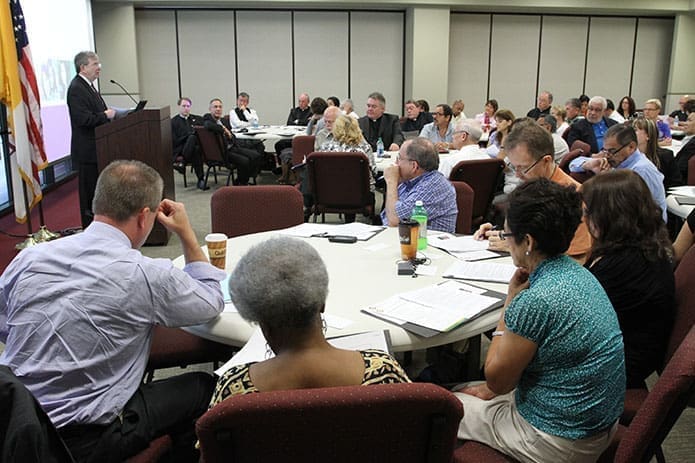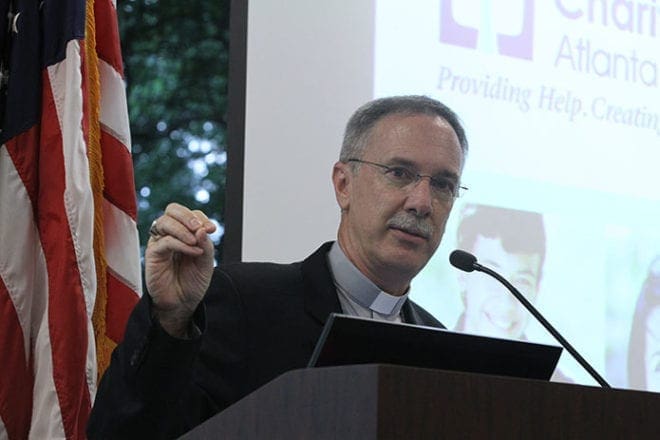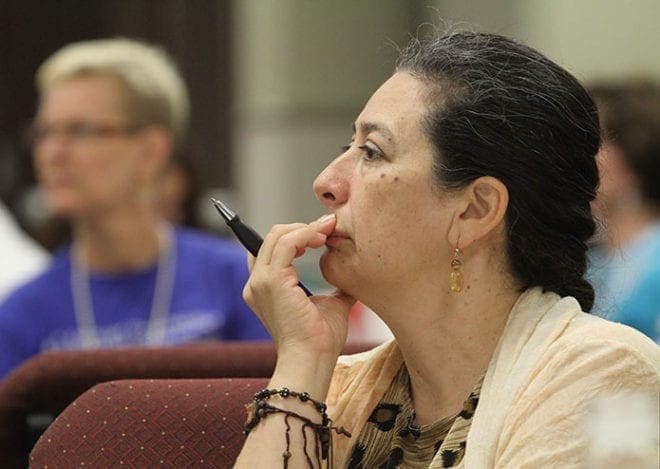 Photo By Michael Alexander
Photo By Michael AlexanderSmyrna
Planning ahead for immigration reform
By ANDREW NELSON, Staff Writer | Published August 1, 2013
SMYRNA—Some 70 pastors and lay leaders attended the first public meeting of the Atlanta Archdiocese’s Immigration Reform Task Force July 19, as federal lawmakers wrestle with renewed attempts to rewrite the nation’s immigration laws.
The goal of the task force is to organize people in parishes and church social services to prepare for what they hope will be reform of the nation’s immigration laws. If reform takes place, organizers expect a wave of undocumented immigrants will turn to the church for help. They would like to offer reliable guidance to those in need when the time comes.
“We don’t like people taking advantage of our people,” said Atlanta Auxiliary Bishop Luis R. Zarama, who is spearheading the effort. “When we help them, we help Jesus.”
Georgia is home to many immigrants, in addition to unauthorized immigrants. There are an estimated 929,155 foreign-born residents, in addition to 425,000 unauthorized immigrants, according to 2010 data from the Pew Research Center and the U.S. census.
Revising immigration laws is under consideration in Washington, D.C. The U.S. Senate passed legislation, but the House of Representatives is unlikely to support the same measures, which include a pathway to citizenship for the estimated 11.1 million undocumented immigrants, enhanced border security, employment verification and other steps.
The local task force includes Bishop Zarama, the Georgia Catholic Conference, which represents the bishops of Atlanta and Savannah, Catholic Charities Atlanta, representatives from the African and Asian Catholic communities and the archdiocesan social justice ministries office, along with pastors from heavily Hispanic parishes.
These coming months, as work on the proposal in the House gets underway, is a “very special time for them and for us,” Bishop Zarama said. Catholics won’t be united in sharing the church’s position on unauthorized immigration, he said.
“We cannot change every heart. That is the reality. We need to confront them with kindness and compassion,” he said.
In addition, the archdiocesan Justice & Peace Ministries, in collaboration with the Georgia Catholic Conference, is hosting a workshop Sept. 14 for clergy and parish leaders to learn about immigration reform.
It will target English speakers and include discussions of the economy, employment, education, health care and crime as they relate to immigration reform.
An informational and catechetical morning session will address Catholic social teaching and the U.S. bishops’ positions on comprehensive immigration reform and its implementation. An afternoon panel discussion will include a focus on issues and challenges related to implementing comprehensive immigration reform at the parish level.
For parishes and pastors, it will require a soft touch, balancing assistance and guidance.
Msgr. Jaime Barona, pastor of St. Michael Church, Gainesville, said the people who want and need the help can expect support from the church, but they will have to do the work.
“I cannot solve your problem, but I will give you the guidance,” he said.

Bishop Luis Zarama makes some opening remarks as the July 19 Immigration Reform Task Force presentation to parish representatives gets underway. Photo By Michael Alexander
Msgr. Dan Stack, who leads St. Francis Church, Cartersville, said parishes needed to be ready to help people who come looking for assistance. He said it’s the right thing to do, but, in addition, parishes will connect with these families and will likely attract new contributing members.
Advocacy is a key part of the process, even though most local members of Congress oppose the church-backed reform measures.
Frank Mulcahy, executive director of the Georgia Catholic Conference, the church’s public policy arm, said an audience member showed him a negative response from a congressman who opposed the proposal.
“You are going to get that, but do it anyway,” said Mulcahy. A letter shows the elected leader there are constituents interested in immigration reform, he said. “You’ve done a good thing.”
Catholic Charities Atlanta will be limited in its ability to help, since it is already swamped with work, said its director, Miguel San Juan.

Gloria Grajales of Divino Nino Jesus Mission, Duluth, listens very carefully as one of the presenters shares some information regarding an immigration issue. Photo By Michael Alexander
Seven lawyers in its immigration legal services are dealing with nearly 500 open cases, with 292 new cases opening a year. Two of the lawyers working on general immigration services each have more than 200 cases to handle, which is 75 more than the acceptable limit, he said.
The agency plans on hosting two educational workshops at the archdiocesan Chancery detailing the changes, when a law is passed. In addition, the agency can prepare educational handouts for parishes to distribute to people who ask about the new law.
Parishioners came to learn how they could get involved.
Mary Francis, who attends Our Lady of Lourdes Church, Atlanta, said she was moved to get involved from teaching middle-school students.
“I’d see them trying to live their lives, knowing the cloud was over them. I thought that was cruel and heartbreaking to these young babies,” she said.
Her parish aims to organize its members to be more vocal advocates for immigration reform, she said.
The Justice & Peace Ministries’ immigration workshop for English speakers is scheduled for Saturday, Sept. 14, from 10 a.m.-2 p.m. at St. Andrew Church, 675 Riverside Drive, Roswell. The cost is $10, which includes lunch and workshop materials. Please RSVP to justpeace@archatl.com or 404-920-7895 by Sept 12.